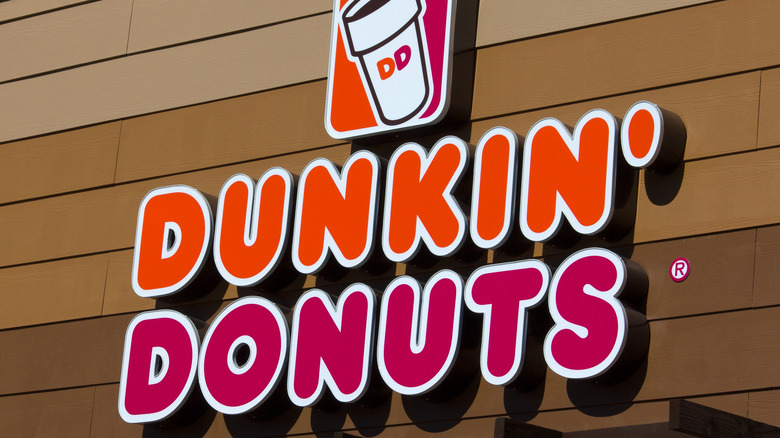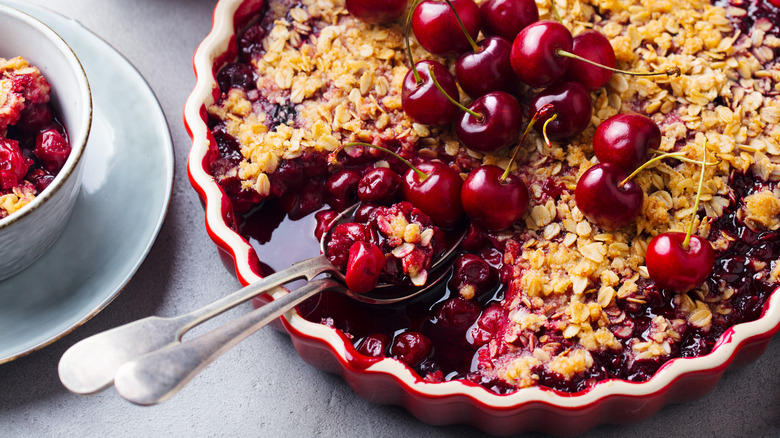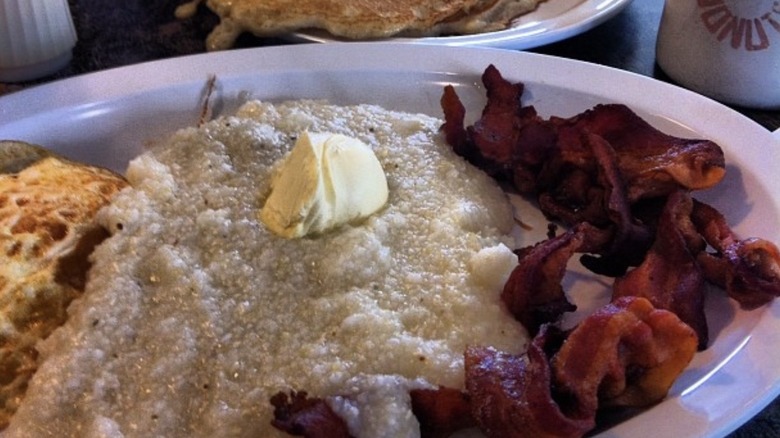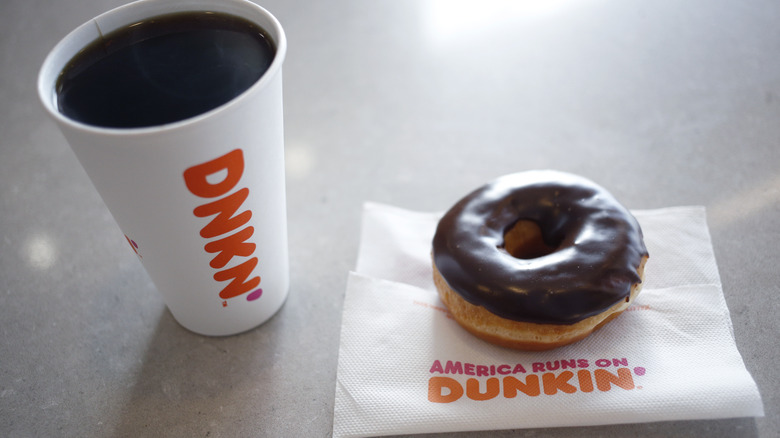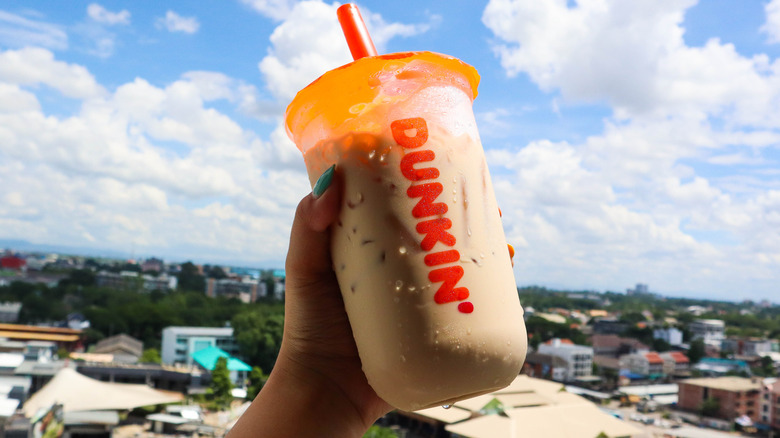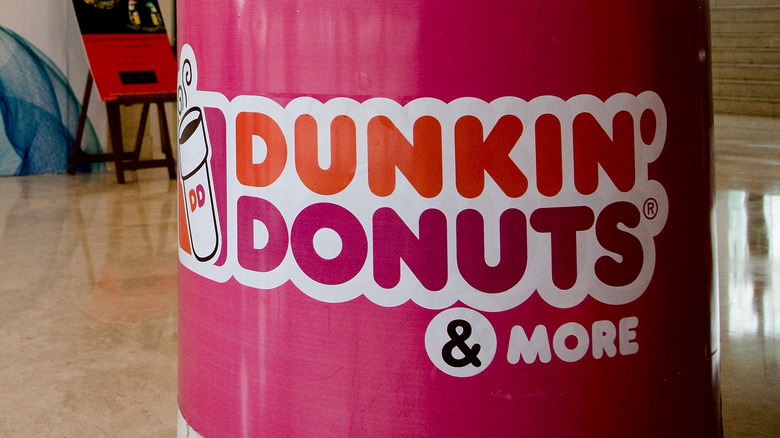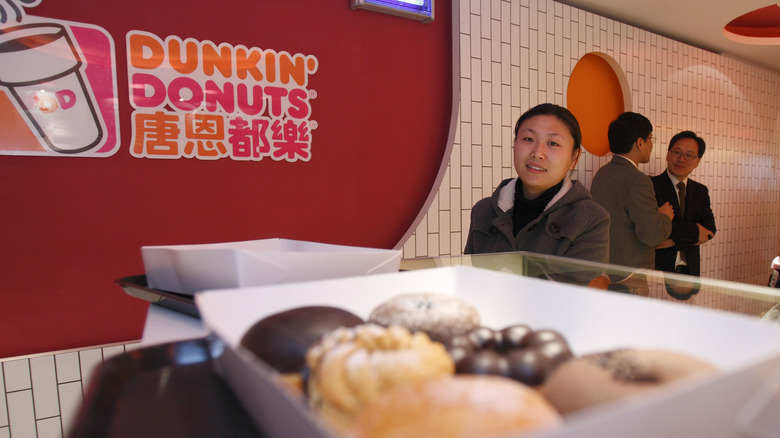The Biggest Dunkin' Donuts Fails Of All Time
"America runs on Dunkin'," or so says the long-running slogan for the chain formerly and still commonly known as Dunkin' Donuts. The chain of more than 11,000 sweet treat bakeries has sold countless donuts, muffins, sandwiches, and steaming cups of coffee to millions over the past 70-plus years. A morning trip to Dunkin' is an unbreakable ritual for Americans in 41 states, a necessary stop to grab a hit of coffee (hot, iced, or creamed and sweetened) and maybe a quick breakfast, be it an egg sandwich or one of the restaurant's many signature donuts, like a Boston Kreme, jelly-filled, glazed, or chocolate-frosted.
Dunkin' is a consistent, enduring part of the food landscape, but it's also a business, one that aggressively expands, evolves, and tries new things as it adapts to new trends, tastes, and customer needs. But even a successful company fails sometimes. Like sprinkles on a frosted donut, Dunkin's long string of successful ventures is dotted with a handful of utter, expensive, and spectacular failures. Here are all the times when Dunkin' flopped hard.
Not many customers wanted a piece of Dunkin' pie
According to former Dunkin' Donuts CEO Robert Rosenberg's corporate memoir "Around the Corner to Around the World," the company hired Massachusetts-based business consulting firm Arthur D. Little in the early 1970s to help expand the company's foodservice empire. In addition to testing out a quickly canceled program to replace skilled human donut-makers with automatic donut-crafting machines, Dunkin' and its consultants struck upon what seemed like a can't-miss idea: pies.
In the late '60s and early '70s, one of the fastest-growing restaurant chains in America (per the Houston Business Journal) was the old-fashioned, home-cooking establishment Marie Callender's. But the real star of the menu: decadent, full-size, freshly-baked pies for customers to take home and enjoy. Dunkin', which had long cornered the market on morning baked goods, wanted a piece of the Marie Callender's pie, which dominated the night-time sweet treats scene. The donut giant started offering pies, prepared and baked off-site, then frozen and delivered to individual Dunkin' locations. The pies went splat — the Marie Callender's-driven pie craze turned out to be a fad, which hurt sales, not to mention that Dunkin' couldn't get enough people interested in a pre-frozen, unproven pie when they could just as easily get a well-regarded, freshly-baked one somewhere else. In 1973, the year Dunkin' canceled its pie plan, it noted losses of $1.7 million.
Dunkin' Donuts sold fish and chips and hats and diner food
Diversification was the name of the game in late 1960s and early 1970s corporate culture. And according to former Dunkin' CEO Robert Rosenberg's book "Around the Corner to Around the World," the company was eager to expand to restaurants that didn't primarily serve just breakfast as well as some other ventures outside its wheelhouse. After dabbling in partnering with IBM to open skill-building supplementary learning centers and a chain of hat shops, Dunkin' put its substantial financial and distribution muscle behind Charles Goodlight Fish and Chips. Rosenberg got that idea after visiting England and seeing how popular the fried-and-salty meal was over in there, but was truly inspired after seeing that a small American chain called H. Salt Fish and Chips had sold to Kentucky Fried Chicken for $15 million.
None of these projects lasted past the mid-1970s. There are no more Dunkin'-owned after-school centers, hat stores, or Charles Goodyear Fish and Chips left in the United States. In the same era, the company also operated a handful of Dunkin'-branded full-service diners that sold donuts, coffee, and the like as well as sandwiches, fish, grits, pancakes, and burgers. According to the Broward Palm Beach New Times, the only remaining Dunkin' Donuts Diner, in Lake Park, Florida, shut down in 2012.
Dunkin' used a potentially offensive tactic in a chocolate doughnut ad
In 2013, per NBC News, Dunkin' Donuts outlets in Thailand introduced the chocolate-flavored Charcoal Donut via a print ad featuring a female model with a face painted totally black, except for her lips. The copy, seemingly predicting the controversy to come over depicting "blackface," read (in Thai), "Break every rule of deliciousness."
Human Rights Watch sounded the alarm bell. "It's both bizarre and racist that Dunkin' Donuts thinks that it must color a woman's skin black and accentuate her lips with bright pink lipstick to sell a chocolate doughnut," Phil Robertson of HRW told the Associated Press. The organization demanded that Dunkin' pull the ad and issue an apology. This fell under the purview not of the U.S.-based Dunkin', but its corporate sibling, Dunkin' Donuts Thailand. "It's absolutely ridiculous," CEO Nadim Salhani told the AP. "We're not allowed to use black to promote our doughnuts? I don't get it. What's the big fuss? What if the product was white, and I painted someone white, would that be racist?"
Nevertheless, American Dunkin' stepped in to apologize and do damage control when its Thai corporate cousins would not. "We are working with our Thailand franchisee to immediately pull the ad. DD recognizes the insensitivity of this spot," the company tweeted. From a PR standpoint, it's a failure, but the attention surrounding the ad may have worked. According to Salhani, sales increased by around 50 percent in the wake of the offensive ad.
Dunkin took heat over iced coffee
On June 17, 2013, according to Inquisitr, Dunkin' arranged a promotion that should have been an utter delight and a lovely gesture of customer appreciation all while increasing awareness of its line of cold, creamy, and caffeinated beverages. But intentions can only get a company so far if they don't execute properly. June 17, 2013 was Free Iced Coffee Day at Dunkin', a fake (but welcome) holiday the chain had celebrated in the past. But while press materials for one such occurrence in 2004 made it explicitly clear that only "participating shops throughout New York, New Jersey, Connecticut, Delaware, and Pennsylvania" would hand out a free, 16-ounce beverage to patrons 18 and older, the 2013 iteration was a disaster. The reason: Social media, and internet usage overall, was much more widespread in 2013, leading to the rapid, non-nuanced spread of the news that Dunkin' was giving away free product. As it had been in the past, many Dunkin' franchisees around the country declined to participate in the promotion, and faced a lot of angry customers and online backlash when their employees failed to deliver on a promise made by some other Dunkin' location hundreds of miles away.
Customers in Dunkin's home state of Massachusetts were particularly peeved. Among the comments on Dunkin's public Facebook wall: "no free ice coffee in massachusetts? WTF? didn't dunkin donuts START in Massachusetts?? booooooooo" and "What happened to free iced coffee day? You advertised and everything... you LIED."
Dunkin' Donuts flopped in India
With thousands of locations across the United States, the frontier of expansion for Dunkin' lay overseas. According to CNBC, Dunkin' made an arrangement with Jubilant FoodWorks, a massive franchisee of Domino's Pizza in Bangladesh, Sri Lanka, and Nepal, to open a large number of doughnut outlets in India. It looked to be a growth market, what with its population of more than 1.3 billion people, and Dunkin' went all in, contracting with Jubilant in 2011 to open 500 shops in India over the following 15 years. According to Dunkin's press release, it was the biggest international push in company history.
Indian food culture is very different from American food culture, however, and from the beginning Dunkin' tried to adapt its menu to traditional local tastes, such as offering more tea choices, mango-flavored shakes and doughnuts, and breakfast sandwiches made with imitation meat (as about two-thirds of the country is vegetarian). In 2014, The Atlantic reported that Dunkin' — rebranded as Dunkin' Donuts & More in India — added curry, chickpeas, and saffron to some of its products' recipes. Those concessions failed to attract many customers. By 2016, only 77 Dunkin' outlets had opened, and in 2018, according to the Economic Times, Jubilant closed down 40. Those branches were, in the words of a Jubilant spokesperson, "unprofitable." As of 2021, there are only 27 Dunkins left in eight Indian cities.
Dunkin wasn't successful in China either
As Dunkin' aggressively went about its ultimately ill-fated plan to expand into India, it remained undeterred in its attempt to gain a foothold in China, home to more than a billion people and a bustling economy. According to the Boston Globe, Dunkin' Donuts first tried to get into the Chinese marketplace in 1994, operating not under Dunkin' but by a name that translates to Dang Ken Sweet Sweet Ring. The company announced its debut by handing out free doughnuts to passersby at the culturally important Great Hall of the People in Beijing's Tiananmen Square. By the year 2000, Dunkin' and Dang Ken were gone, with the company learning the tough and expensive lesson that China didn't have much of a pre-existing culture (and thus demand) for coffee, while customers found American-style doughnuts to be overly and unpleasantly sweet.
Taking the lessons of the failure to heart, Dunkin' re-entered China in 2008 with doughnuts that food scientists specially developed with less sugar and perfecting with extensive test marketing. Again, Dunkin' flopped. According to a market research group, it was because the chain presented itself as a bare bones operation, while the target audience of wealthy and middle-class customers who had traveled to the U.S., wanted something more upscale.
Dunkin' seemingly doesn't back away from a challenge. In 2015, the company announced plans to open 1,400 stores in China, but by 2020, according to the Boston Business Journal, only 71 were up and running.
